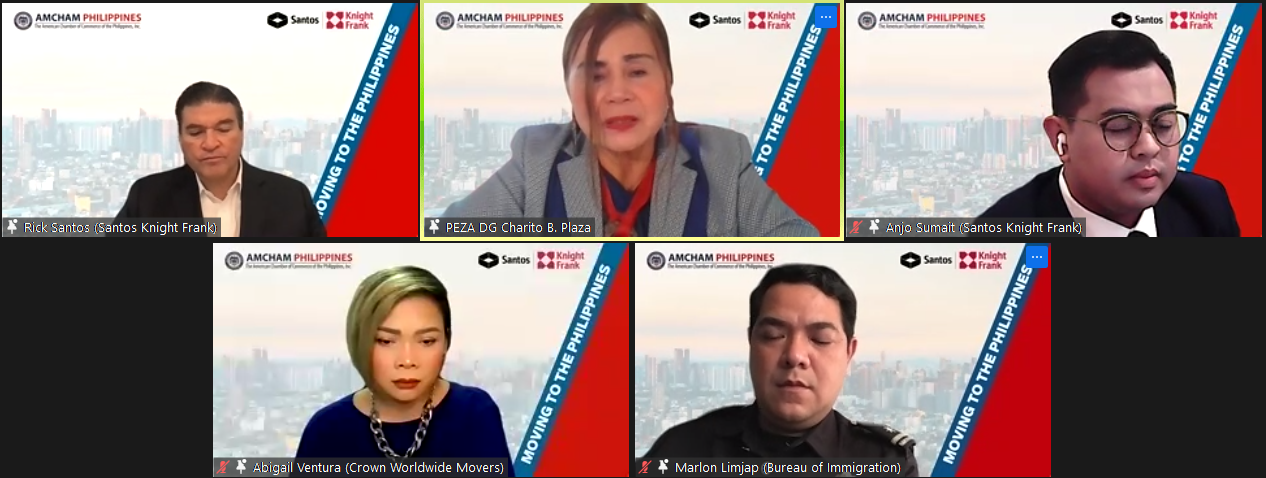JUNE 22, 2022 – The Philippines is now seeing a gradual return of business travel, including foreign expatriates and talent relocating to the country, in the backdrop of high vaccination rate, easing of travel restrictions, and return-to-office programs.
Leading real estate services company in the Philippines Santos Knight Frank partnered with the American Chamber of Commerce Philippines (AmCham Philippines) for ‘Moving to the Philippines: Relocation & Real Estate’, a virtual industry sector gathering for occupiers and multinational company representatives on June 22nd, 2022. The webinar was joined by The Philippine Economic Zone Authority (PEZA), The Bureau of Immigration, relocation company Crown Worldwide Group, and residential services representative from Santos Knight Frank.

Marlon Limjap III, Deputy Terminal Head of Operations, Bureau of Immigration says: “The past few months have seen an increase in flights, arrivals and departures. Countries are already opening up their borders whether for tourism or business. We’re doing the same in the Philippines, but slowly and safely”, on the latest travel guidelines.
The rising global inflation and restrictions in travel have had significant impacts on logistics and relocation services, but according to Abigail Ventura, Business Development Manager for Crown Worldwide Group, the demand for immigration services remains and depend on ever-changing travel regulations.
Ventura cites delays in planning, scheduling, and cancellation from companies due to emerging COVID-19 variants as main challenges when it comes to expat relocation.
“Since borders have reopened, there has been an increase of expats coming back and returning to their assignments that were put on hold. We’re now back to pre-pandemic processes with some changes on how we do things, like giving our clients the best experience in the process,” adds Ventura.
Keeping the country competitive
Ventura maintains that because of “strategic location and its availability of topnotch, English-speaking workforce” the Philippines remains an attractive market for investors and is a strong choice for businesses to set up their headquarters of offices.
One of the agencies implementing the government’s incentive programs for investors is the Philippine Economic Zone Authority (PEZA), a top export-oriented investment agency. In PEZA’s 27 years, they have approved 417 economic zones nationwide and 4,632 locator companies, equivalent to PhP 4.036 trillion in investments, USD 933.835 in exports, and 1.7 million in direct employments.
Charito ‘Ching’ Plaza, Director-General of PEZA says: “Despite challenges, PEZA has remained firm in performing its mandate of promoting investments, creating employment, generating exports, with its goal in making the Philippines the go-to investment haven in Asia.”
As a congresswoman, Plaza had authored RA 7916 that developed special ecozones and the RA 11534 aka the Corporate Recovery and Tax Incentives for Enterprises (CREATE Law) that provide fiscal incentives, enhanced deduction, more employment opportunities for foreign nationals, and the issuance of PEZA 47A2 VISA or PEZA VISA, which entitles expats to certain exemptions from the Bureau of Immigration.
“We assure that we will continue to provide the best assistance to investors and advocates investing in the Philippines because of the incentives we provide”, says Plaza.
Residential leasing
The return of expats after two years of the pandemic is reflected in the residential real estate market in Metro Manila. Santos Knight Frank has noted the increasing demand for condominiums and exclusive villages popular for expat leasing and the gradual price recovery of rent in certain areas of the city.
A new wave of expansion plans from IT-BPM companies will fuel the growth of office leasing, significantly impacting the acquisition of condominium rentals in CBDs in the medium term.
According to Anjo Sumait, Assistant Manager for Residential Services at Santos Knight Frank: “Landlords and homeowners are repositioning their rental properties with pre-pandemic rates, given that the demand is back from business travelers and multinational expats returning to the CBD.”
What expats should look out for
Sumait advises: “With two years of the pandemic having passed, multinational companies and expats should be more conscious of new regulations, protocols, and updates of the properties and buildings they are looking at, and they should be open to adapt to changes. Be in the know when it comes to housing rates, especially those prices which have been renegotiated to pre-pandemic prices. While landlords are becoming firmer due to housing demands, they may still be flexible with terms and conditions.”

